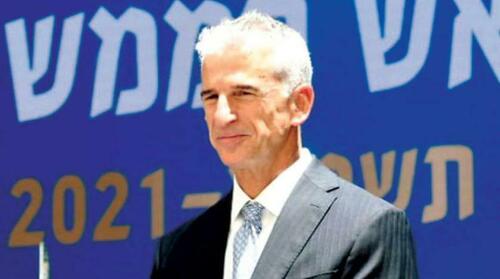
While the world still awaits Tehran and Washington's final verdicts on the finalized text of a restored JCPOA (so far all signs point to it unraveling as things once again appear to stall), Israel has said that its military and intelligence is prepared to act against Iran even if a deal is signed.
While this isn't the first time Israeli officials have issued such a threat, it is a rare moment that the head of the Mossad intelligence agency publicly spoke out this bluntly and revealingly:
Criticizing the United States for rushing into a terrible deal, Mossad Director David Barnea said on Thursday that a new nuclear pact with Iran would not block his agency from acting against the Islamic Republic to protect Israel’s security interests.

The remarks came in a top level government meeting with Prime Minister Yair Lapid and other officials amid fears in Israel that a final restored nuclear deal is imminent.
Barnea, who has been the country's spy chief for a little over a year, stressed that given "Israel has not signed on to the deal" it remains that "Israel is permitted to defend itself in any way possible – and will act this way."
"We cannot sit quietly and just watch as the danger grows closer," Barnea said further. His stark assessment and preparatory warnings that Israel is prepared for the 'day after' a deal strongly suggests that it's Mossad's assessment that a final agreement is just around the corner.
Further emphasizing Israel's freedom to act, he said:
"We deal with Hezbollah, not the US. We deal with Islamic Jihad, not the US; and with militias and the IRGC in Syria. We need to deal with this. Clearly, the US can get up and leave [the region] one day; we cannot leave. We are here. There are also conceptual differences and in our worldviews."
The top spy continued: "The strategic leaning by both the US and Iran to sign on to a new JCPOA [nuclear deal] does not change Iran’s long-term desire to obtain a nuclear weapon."
As for his mention of Syria, it remains the place where Israeli airstrikes have picked up in frequency and intensity of late, earning condemnation from Russia. Israel has said it is a security "red line" for Iranians to be operating in Syria, or also Iran-backed Hezbollah.
While the world still awaits Tehran and Washington’s final verdicts on the finalized text of a restored JCPOA (so far all signs point to it unraveling as things once again appear to stall), Israel has said that its military and intelligence is prepared to act against Iran even if a deal is signed.
While this isn’t the first time Israeli officials have issued such a threat, it is a rare moment that the head of the Mossad intelligence agency publicly spoke out this bluntly and revealingly:
Criticizing the United States for rushing into a terrible deal, Mossad Director David Barnea said on Thursday that a new nuclear pact with Iran would not block his agency from acting against the Islamic Republic to protect Israel’s security interests.

The remarks came in a top level government meeting with Prime Minister Yair Lapid and other officials amid fears in Israel that a final restored nuclear deal is imminent.
Barnea, who has been the country’s spy chief for a little over a year, stressed that given “Israel has not signed on to the deal” it remains that “Israel is permitted to defend itself in any way possible – and will act this way.”
“We cannot sit quietly and just watch as the danger grows closer,” Barnea said further. His stark assessment and preparatory warnings that Israel is prepared for the ‘day after’ a deal strongly suggests that it’s Mossad’s assessment that a final agreement is just around the corner.
Further emphasizing Israel’s freedom to act, he said:
“We deal with Hezbollah, not the US. We deal with Islamic Jihad, not the US; and with militias and the IRGC in Syria. We need to deal with this. Clearly, the US can get up and leave [the region] one day; we cannot leave. We are here. There are also conceptual differences and in our worldviews.”
The top spy continued: “The strategic leaning by both the US and Iran to sign on to a new JCPOA [nuclear deal] does not change Iran’s long-term desire to obtain a nuclear weapon.”
As for his mention of Syria, it remains the place where Israeli airstrikes have picked up in frequency and intensity of late, earning condemnation from Russia. Israel has said it is a security “red line” for Iranians to be operating in Syria, or also Iran-backed Hezbollah.







